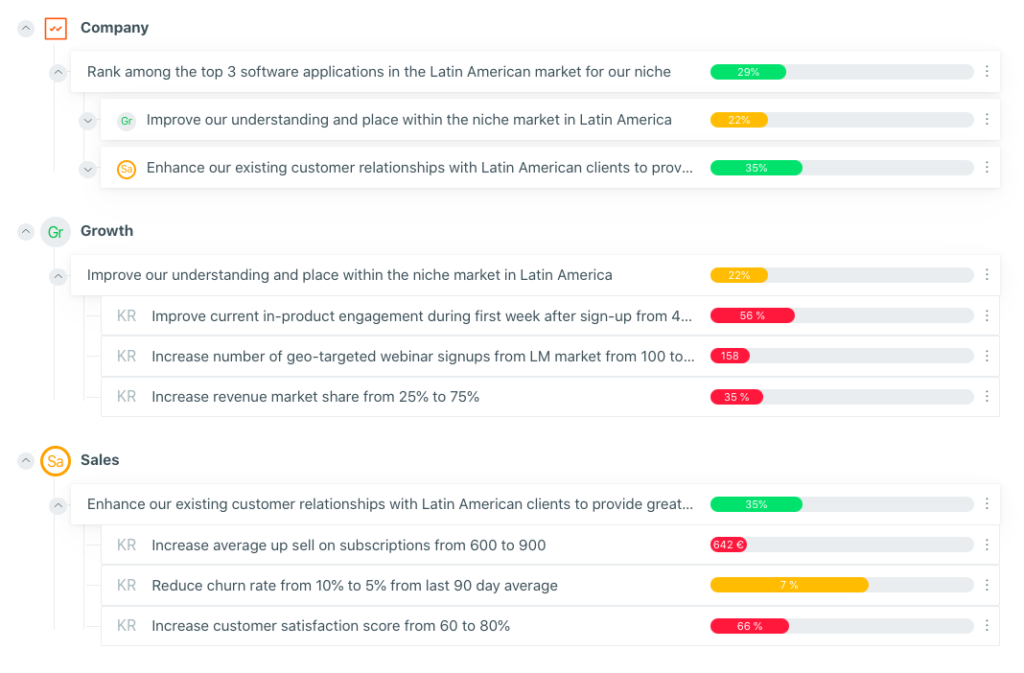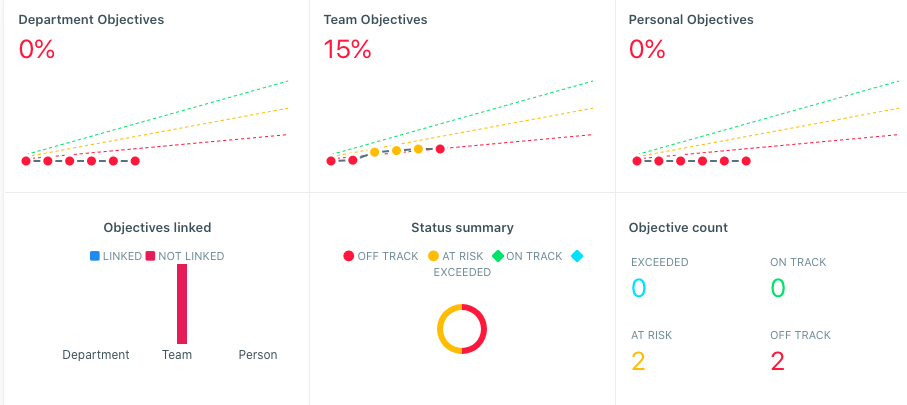Countless hours are spent each year trying to align team members with the company’s goals. Like clockwork, companies continue to use ordinary procedures and practices to achieve extraordinary results.
Objectives and Key Results (OKRs) are the solution companies are looking for that align departments and organize daily operations.
In this article, we’ll discuss why OKRs matter for businesses to help you determine whether the methodology is one your company could benefit from using.
Common Business Struggles
As organizations grow in size the operations of the business become more complex. Bigger goals require more projects and tasks, which require more employees, which ultimately adds more elements to manage.
Businesses struggling to gain focus on the key aspects that drive growth and revenue are in need of an organizational system. Too many added responsibilities have blurred the alignment between operations and long-term vision.
One sign your business is struggling with focus is not hitting quarterly goals.
The ambitions of the company are greater than the execution of the team. You’ve set goals that can help drive the profit of the company but your team rarely achieves them.
A clear OKR system helps create clear objectives for the company as a whole as well as each team. Quantitative key results are created for each objective to ensure teams know how to follow through with assignments.
OKRs Save the Day – or Do They?
OKRs have the potential to change organizational culture but only when used correctly. The question still arises, “Are OKRs a waste of time?”
To bring out the full value of using OKRs, it’s imperative your team holds weekly OKR check-ins to discuss the progress of your OKRs. Not committing to this step of the process is one way to miss out on all OKRs have to offer. Without habitual, consistent check-ins, it’s easy for teams to become disconnected from the focal point for the quarter. They may start working on tasks that don’t add up to the progression of the overall goal. This can leave employees feeling overwhelmed, bogged down, and unmotivated.
When adopting OKRs you must also differentiate between attainable and unattainable short-term, quarterly objectives. It is best practice to understand that during your first few quarters you may fall short. Consider setting committed goals rather than aspirational to help your team gain confidence and momentum when your business needs to scale more quickly.
10 Reasons Why OKRs Matter
Business owners often rely on their own determination and grit to get through the hardships of growing a business. They don’t realize how much easier it could be with an organizational system. If you’re asking yourself “Are OKRs useful?” then maybe you haven’t yet realized the full potential of what they bring to your business.
Here are 10 reasons why OKR is important for the long-term health and growth of your business.
1. Aligns daily operations with long-term vision
It’s easy to set a long-term vision for your company but it’s much harder to execute it day in and day out. Setting OKRs gives leaders a way to take that big picture and break it down into manageable tasks.
Each quarter, you’ll set objectives that directly contribute to your company’s overall goal. These objectives will have specific key results that need to be met in order for the objective to be considered successful. Over time, every executed task in a company will be working toward the long-term vision.
2. Aligns all teams in the organization
Departments and teams start growing a mind of their own if not managed properly. Sales will have their own opinions on how to drive revenue as will marketing and customer service. To align them all toward a common goal, you must implement a system that creates a thread between all departments.
With the OKR methodology, you can set company-level objectives as well as department and team-level objectives and key results to ensure everyone is aware of how their work accomplishes the bigger picture.
3. Creates room for innovation
OKRs give employees the capacity for complete focus on one objective. They know what is important for the company at that moment and can devote their time to thinking of new and innovative ways to complete the task. This could lead to a major breakthrough in your industry.
It’s difficult to be completely focused on one task when there are other elements pulling at an employee’s attention. An goal management tool like OKRs lets your team consider how they are currently completing a task and question how the process could be improved.
4. Makes the team adaptable to changes
Setting up short-term OKRs in your business and monitoring them consistently makes it easier for your team to pivot. Issues recognized in weekly OKR check-ins allow teams to make the necessary adjustments to find solutions before they become bigger problems.
Otherwise, your organization could go an entire quarter or year before solving a problem that could have increased revenue by 20%.
5. Holds teams and individuals accountable

When specific objectives are set that are further broken down into tangible key results, it becomes much easier to hold individuals and teams accountable.
Teams that don’t achieve their key results become easier to identify and reach out to regarding the struggles they’re experiencing and how to help. Motivation to achieve objectives can drive competition within the company and increase productivity.
6. Achieves the full potential of the organization
Giving your staff an organized system of accomplishing objectives through actionable key results helps achieve the full potential of your team.
As you’ve learned from the sections above, OKRs drive teams to work together, adapt to changes, and align with a long-term vision. By implementing all of these benefits in your organization, you will be on your way to achieving long term success.
7. Simple and easy to integrate
OKRs work so well for businesses because of the simplicity of the system. It’s easy to integrate into your business without having to overhaul your current organizational structure.
OKRs have been used by some of the world’s most successful organizations including Google, Facebook, and LinkedIn. These companies were able to take OKRs and integrate them into their systems without falling behind.
8. Tracks metrics that inform business decisions
The objective part of your OKR is the qualitative goal you are trying to reach. But the key results are tangible metrics you track to see if the business is expected to reach its objective.
This data is essential in making decisions about the future of your business. If a metric is not pointing in the right direction, you can use that data to make changes to your OKR before your team fails its goals.
9. Changes cultural values
Implementing the OKR system into your organization will change the way your business functions. The culture of your organization will start to value collective outcomes that drive real business results.
Over time, new employees will come to adopt the OKR system as normal practice and the culture of your organization will be built around it.
10. Exposes risk in operations
As your team tracks the progress of OKRs they will undoubtedly find areas of improvement and potential risks within the company. Unrefined code may present issues down the road or a broken sales process could be costing you customers.
With such attention to detail, its possible to find these risks early and your team can take the necessary steps to mitigate them before they cause irreparable damage.
Start using the OKR Approach Today
Businesses who find trouble setting or achieving their quarterly or long-term goals due to loss of focus will benefit from implementing OKRs in daily operations. Departments will become aligned, your team will become more adaptable, and the culture of your organization will recognize collaborative efforts over individual accomplishments.
Now that you know more about why OKRs are useful, are you interested in using OKR management software for your team?
To learn more about the OKR system, Weekdone — one of the top OKR software options — provides lots of valuable resources.
- Review this guide to the 24 Best OKR Software for 2023.
- Read through this Ultimate Objectives and Key Results Guide for more information.
- Check out these examples of good OKRs and case studies to learn why business OKRs actually work.


